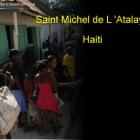ADVERTISEMENT
Rafael Trujillo - Haiti Observer Blog
Rafael Trujillo, Haiti Observer Blog. Read the following articles about Rafael Trujillo
Caribbean leaders to impose sanction on Dominican Republic
The Caribbean community (Caricom) should be commended for taking its first action against a cancer that is growing and spreading in the Dominican Republic. Declaring that it can no longer be business as usual, they suspended the Dominican Republic's application to join its regional economic bloc, following the court decision in Dominican Republic to remove the citizenship of many Dominicans with Haitian background.
The Dominican Republic must really have a huge problem with Black people, Haitians in particular since not only they are black, they are also poor.
After the Haitians, will they ask that only white people comes to visit the country?
Parsley Massacre of Rafael Trujillo, one of the least-known genocides
Antihaitinismo isn't an abstract term that Haitians hide behind when they want to speak badly about their treatment in the Dominican Republic. Such an outlook depends on the thing being inchoate and not substantiated by decades of example and legislative proof.
When, in 1937, the Dominican Republic despot, Rafael Trujillo ordered the execution of somewhere between 9,000 and 20,000 Haitian immigrants, the world took scant notice, and the country, Haiti's closest neighbor, continued to fester in its anti-Haiti doctrines and practices. This wrong, not punished for what it was, helped shaped the minds that today, in 2013, have passed a cruel piece of legislature that would strip Haitians, born in or out of the Dominican Republic of the right of citizenship.
Elie Lescot Ruled by Force and Intimidation
Elie Lescot became Haiti's 31st president in 1941. Born into the mulatto elite class, Lescot began his political career after the death of his wife. He served in the Chamber of Deputies, Parliament's lower house, later becoming a political appointee under presidents Borno and Vincent.
His position as Ambassador to the Dominican Republic (DR) led him to become an ally of DR President Trujillo. Trujillo's political capital helped Lescot win the presidency, despite the Chamber of Deputies opposition of him.
Elie Lescot immediately wielded power by installing himself as Commander of the Military Guard and populating government posts with Caucasian and mulatto elites. Haiti's majority black populace detested him for his prejudice.
Stenio Vincent Uneasy Alliance with the Dominican Republic
Stenio Vincent was the 30th President of Haiti, from 1930-1941. Born of mixed-race parentage, he earned his law-school degree by his 18th birthday. He rose to prominence in the leadership role in the Chamber of Deputies before running for the presidency. As part of his political platform, he voiced extreme disapproval of the U.S. occupation of Haiti. Vincent won the National Assembly majority vote and assumed office in October 1930.
By 1934, after U.S. military forces pulled out, Stenio Vincent began oppressing opposition leaders, spying on and incarcerating them. Now a loyal supporter of U.S. democracy, he became signatory on a trade agreement with them. In 1935, he won the popular vote, keeping him in office until 1941.
Parsley Massacre - Slaughtering of Haitians By The Dominicans
Haiti was under military occupation for around 19 years. In the Dominican Republic from 2nd October 1937 to 4th October 1937 fifteen thousand to twenty thousand immigrant workers from Haiti were massacred. Machetes and bayonets were used to slaughter them by big landowners and the army in Dominican Republic.
Pitchforks were used to spear women and heads of infants were smashed against the walls. No firearms were used in the Parsley Massacre. The ones who tried to escape were captured at the border and then killed.
Antihaitianismo, a racial prejudice manifested In Dominican Culture
The Hispaniola Island is shared by the Dominican Republic and Haiti for around 150 years. But both countries do not share an amicable relationship. Antihaitianismo is a set of anti prejudices that have been created by antagonism in the Dominican Republic.
Evolution Of Racial Prejudice
Antihaitianismo is the evolution of racial prejudices manifested for a long time, misinterpretation of selective historical facts and creation of false consciousness in the Dominican Republic. The elite groups, who were powerful and having strong interests to defend, orchestrated the long term revolution.
Inhabitants from Spain colonized Santo Domingo and it was then that racial prejudices started leading to antihaitianismo. Racial prejudice, slavery besides sugar was brought to the island due to Spanish colonization. Administration was controlled by elite white Spanish who ruled over the slaves and creoles.
Our objective is to share with you news and information about Haiti and the people of Haiti. Traditions, habits and the way we were or grew are alive in this site. We highly recommend that you Subscribe to our Newsletter and also share with us some of the things that are memorable and made us unique people.

 Haitian Thanksgiving
Haitian Thanksgiving  Saint Michel de L 'Atalaye
Saint Michel de L 'Atalaye  Something to think about
Something to think about  Haiti tech Summit
Haiti tech Summit  Haitians are a Proud People
Haitians are a Proud People